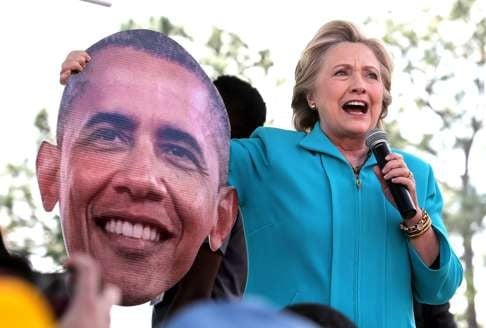
Is Taiwan the trump card in Sino-US relations?
Wenran Jiang says as shocking as Donald Trump’s challenge to the decades-old US stance may seem, Washington’s military and commercial interests in Taiwan could well play a role

After a carefully coordinated call with President Tsai Ing-wen of Taiwan, Trump now claims his administration may not be “bound by a ‘one-China’ policy unless we make a deal with China having to do with other things, including trade”.
Watch: Beijing says Trump call was “petty action” by Taiwan
From the Trans-Pacific Partnership (TPP) to the Paris climate deal, Trump has targeted many of President Barack Obama’s signature policies, but his sharpest attacks on a foreign country have focused on China. His accusations range from “raping America,” “currency manipulator,” “greatest jobs theft in history,” “unfair taxes on our companies” and military build-up in the South China Sea, to not helping the US at all on North Korea.

‘I don’t know why we have to be bound by a one-China policy’: Trump questions decades-long stance
Surprising as his comments might seem, Trump’s China policy orientation has its roots in the Obama administration. Obama pursued the “pivot to Asia”, a strategic “rebalancing” of US interests from Europe and the Middle East towards East Asia, as advocated by then secretary of state Hillary Clinton. The US strengthened its military alliance with Japan and South Korea, announced the deployment of the THAAD anti-missile system in the Korean peninsula, stepped up military cooperation with Australia and the Philippines, improved relations with Vietnam and India, and repeatedly sent its navy and air force to the South China Sea – all viewed by Washington as necessary to counter China’s assertiveness, but seen by Beijing as measures to contain China’s rise.
Watch: US air power on display in war games over Pacific
What is certain is that Trump’s dealings with Beijing will begin with more confrontation
Yet, at the same time, Obama actively engaged China, from regular summit meetings with President Xi Jinping (習近平) to the annual high-level US-China Strategic and Economic Dialogue.
Therefore, Trump’s phone call with Tsai and his comments on the “one-China” policy must be understood in the broader context of his policy towards Beijing. Details have emerged that some of his foreign policy advisers, including Reince Priebus, chairman of the Republican National Committee and the president-elect’s pick as chief of staff, have close ties to Taiwan; that the Trump team lobbied to insert stronger language of support for Taiwan into the Republican election platform during the summer; and that Bob Dole, the 1996 Republican presidential nominee and a former Senate leader, facilitated the call as a paid lobbyist of the Taiwanese government.

No country is exempt from one-China principle, says Beijing
While reactions to Trump’s Taiwan move have been mostly shock and concern, few have paid attention to the fact that Taiwan is more than just a bargaining chip for the US to gain leverage with China. The island is currently the ninth-largest US trading partner. Since 2010, Taiwan has been the largest buyer of US arms in the Asia-Pacific, totalling more than US$14 billion, plus another US$6.2 billion in US licences in arms sales and services. These sales include some of the most advanced weapons, such as AH-64E Apache attack helicopters, Patriot Advance Capability-3 missiles, F-16 fighters and advanced munitions.
Keeping pace with continued arms sales to Taiwan, the US government has been quietly but gradually upgrading its military and political contacts with the island while officially being committed to the “one-China” policy.
Watch: Trump questions continuing ‘one-China’ policy
More arms sales to Taiwan fit perfectly with Trump’s campaign rhetoric, that US allies must shoulder more financial costs in exchange for continued US protection
This means Washington will send high-level civilian and military officers, including assistant secretaries of defence and generals, to meet their Taiwan counterparts on an annual basis.
Relations between the US and Taiwan have been upgrading even under the Obama administration. Given that fact, Trump, along with many of his team members harbouring hostility towards China, will continue to expand these military and commercial interests in Taiwan.
It is worth recalling that Trump tweeted on US arms sales to Taiwan several years ago, accusing Obama of being too concerned about Beijing’s reactions.
Now, more arms sales to Taiwan fit perfectly with Trump’s campaign rhetoric, that US allies must shoulder more financial costs in exchange for continued US protection.
Selling more arms will create jobs and promote US exports while reducing the US burden in East Asia.
In such a scenario, it is also likely that Trump will pursue a similar arrangement, modelled after Taiwan, with Japan and South Korea. Both were on Trump’s hit list during the presidential campaign for taking advantage of the US in their alliance relationship.
Watch: Putin and the US election hack
If Trump gets his way, he will pressure Tokyo and Seoul to pay more for the US military bases in the two countries, short of renegotiating the existing defence treaties. And in addition to extracting trade-related concessions, Trump may also push for Japan and South Korea to buy more US arms, creating employment at home while letting Tokyo and Seoul contribute more in dealing with the North Korea threat, and balancing against China at the same time.
Now that Trump has decided to bring Taiwan back as a negotiating card in US-China relations before he takes office, Beijing has taken a firm stand that the one-China principle is non-negotiable. What is unknown is how Trump’s yet to be articulated Russian policy fits into his unfolding China game.
Wenran Jiang is a political science professor at the University of Alberta, Canada, and a global fellow at the Woodrow Wilson Centre for International Scholars. Reprinted with permission from YaleGlobal Online. http://yaleglobal.yale.edu
